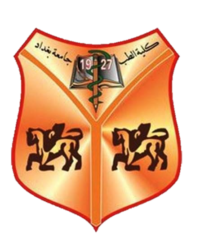Mission
- The College of Medicine of the University of Baghdad aims to deliver excellent medical education to provide competent medical graduates who will be well-prepared to work in Iraq and elsewhere and be able to undertake postgraduate training.
- The medical curriculum focuses on the learning outcome to graduate doctors who are able to perform their duties as junior doctors in providing health services and possess the basic medical skills expected from students studying at the University of Baghdad.
- The curriculum offers increasing opportunities to examine patients in the community, promoting a higher degree of integration of basic medical sciences with clinical practice; in addition to facilitating student learning and paying attention to their medical choices.
- The curriculum will be organized according to body systems rather than focusing on specific topics and will discuss symptoms of different diseases.
- The curriculum will depend on integrated learning activities based on medical cases and patients in a systematic education manner to ensure optimum efficiency in key areas.
- increasing the self-learning ability of the students through increasing reliance on IT-based and distance learning materials and activities.
- The assessment of students' learning outcomes is consistent with the objectives and the specific standards stated in the curriculum.
- Students will receive regular feedback on their progress aided by a personal tutor.
- The curriculum will be managed by a multidisciplinary team and involve medical educators from different specialties.
- A monitoring system will be established to evaluate the implementation of the curriculum and to support a process of continuous development
- Providing community primary health services by trained medical students, as needed, mostly by examination rather than treatment and collecting data.
Learning outcomes
- The fundamental purpose of medical education in Baghdad Medical College/University of Baghdad is to graduate safe competent lifelong learner doctors and establish a foundation to continue their careers as expressed in these learning outcomes:
- These objectives include the ability to demonstrate competencies in:
- Application of biomedical scientific principles and basic science knowledge as integrative disciplines in a system-based model to serve clinical practice.
- Recording the medical history of the patient, conducting a general examination and a systemic clinical examination, in addition to being able to choose appropriate examinations and interpret their results to solve problems and make decisions.
- Basic knowledge and indications of common laboratory and radiological investigations and the procedures required to obtain the necessary samples.
- Learning essential practical and procedural basic skills of daily doctor practice.
- Adopting appropriate techniques for communicating with patients, their families, colleagues in the profession, and all medical personnel, and the ability to manage difficult situations.
- Providing first aid, basic resuscitation, and life support for all age groups.
- Work effectively as part of the emergency care team in managing life-threatening cases, whether caused by accidents or diseases.
- Appropriate professional behavior and basic knowledge of principles of medical ethics and legal responsibilities.
- Acquire technical skills in using computers to retrieve, collect and interpret electronic information related to patient care, health promotion, patient counseling, information, research, and education.
- Performing the necessary tasks for public primary health care programs and identifying preventive and control measures necessary to solve health problems in the community.
- Applying quantitative measurement methods and collaborating with peers in clinical medical research and basic knowledge in evaluating scientific research.
- Work as a part of the educational and health services team.
Competencies
- Medical knowledge: Understand the normal structure and function of the body, explain the development of various pathologic processes, and use scientific methods to establish the causation of diseases and the efficacy of therapies.
- Clinical, practical, and procedural skills: Recognize patients with life-threatening conditions regardless of the etiology, and administer appropriate initial therapy. Achieve appropriate standards of the required skills in the patient care process.
- Communication and interpersonal skills: Communicate effectively and sensitively with patients and their relatives. Communicate clinical information both verbally and in writing to medical colleagues and other healthcare professionals involved in patient care.
- Professionalism: Demonstrate an understanding of legal and ethical principles and responsibilities to patients, peers, and members of the healthcare team.
- Practice-based learning and improvement: Investigating and evaluating health care provided to patients and using scientific methods in developing it through continuous self-evaluation.
- Lifelong learning: Adopt a lifelong learning method by sharing, perusing, and updating information of relevant scientific developments in medicine

